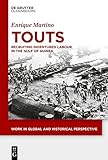Touts : Recruiting Indentured Labor in the Gulf of Guinea / Enrique Martino.
Material type: TextSeries: Work in Global and Historical Perspective ; 14Publisher: München ; Wien : De Gruyter Oldenbourg, [2022]Copyright date: ©2022Description: 1 online resource (XII, 271 p.)Content type:
TextSeries: Work in Global and Historical Perspective ; 14Publisher: München ; Wien : De Gruyter Oldenbourg, [2022]Copyright date: ©2022Description: 1 online resource (XII, 271 p.)Content type: - 9783110754643
- 9783110755961
- 9783110755923
- Contract system (Labor) -- Equatorial Guinea -- Fernando Po -- History -- 19th century
- Employees -- Recruiting -- Equatorial Guinea -- Fernando Po -- History -- 19th century
- Indentured servants -- Equatorial Guinea -- Fernando Po -- History -- 19th century
- Golf von Guinea
- Plantagenwirtschaft
- Sklavenhandel
- Äquatorialguinea
- HISTORY / Social History
- Equatorial Guinea
- Nigeria
- contract labour
- free and unfree labour
- 331.73
- HD4875.E6 M378 2022
- online - DeGruyter
- Issued also in print.
| Item type | Current library | Call number | URL | Status | Notes | Barcode | |
|---|---|---|---|---|---|---|---|
 eBook
eBook
|
Biblioteca "Angelicum" Pont. Univ. S.Tommaso d'Aquino Nuvola online | online - DeGruyter (Browse shelf(Opens below)) | Online access | Not for loan (Accesso limitato) | Accesso per gli utenti autorizzati / Access for authorized users | (dgr)9783110755923 |
Frontmatter -- Acknowledgements -- Contents -- Abbreviations -- List of Maps and Illustrations -- Introduction: Smugglers and Strangers -- 1 Indentured Contract Labor -- 2 Take or Give: Recruiting Techniques -- 3 Panya: Contractual Inversions -- 4 Dash: Contractual Doubling -- 5 Lumpen-brokers -- Conclusion: Making Colonial Labor Markets -- Archives -- Bibliography -- Index
restricted access online access with authorization star
http://purl.org/coar/access_right/c_16ec
Touts is a historical account of the troubled formation of a colonial labor market in the Gulf of Guinea and a major contribution to the historiography of indentured labor, which has relatively few reference points in Africa. The setting is West Africa’s largest island, Fernando Po or Bioko in today’s Equatorial Guinea, 100 kilometers off the coast of Nigeria. The Spanish ruled this often-ignored island from the mid-nineteenth century until 1968. A booming plantation economy led to the arrival of several hundred thousand West African, principally Nigerian, contract workers on steamships and canoes. In Touts, Enrique Martino traces the confusing transition from slavery to other labor regimes, paying particular attention to the labor brokers and their financial, logistical, and clandestine techniques for bringing workers to the island. Martino combines multi-sited archival research with the concept of touts as "lumpen-brokers" to offer a detailed study of how commercial labor relations could develop, shift and collapse through the recruiters’ own techniques, such as large wage advances and elaborate deceptions. The result is a pathbreaking reconnection of labor mobility, contract law, informal credit structures and exchange practices in African history.
Issued also in print.
Mode of access: Internet via World Wide Web.
In English.
Description based on online resource; title from PDF title page (publisher's Web site, viewed 02. Mai 2023)


